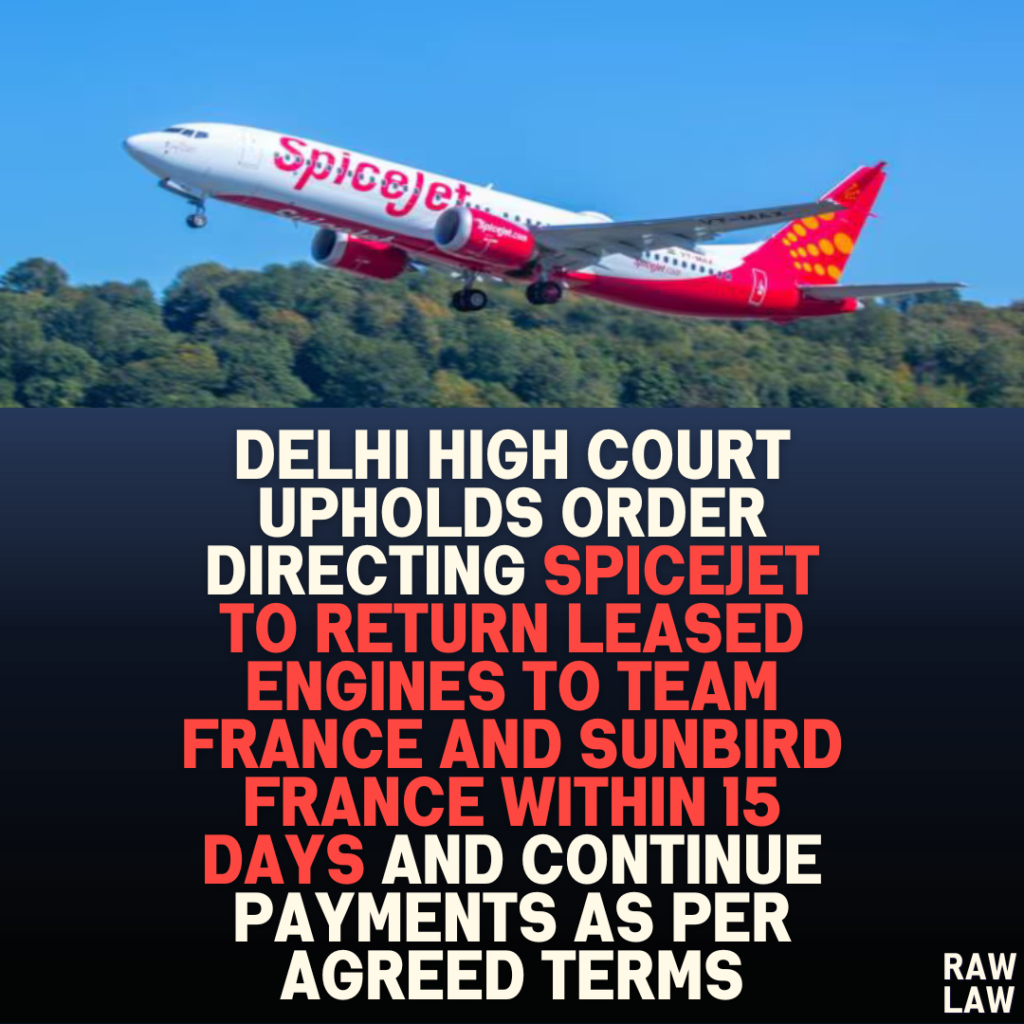Court’s Decision:
The Delhi High Court upheld the Single Judge’s interim orders, requiring SpiceJet to return three leased aircraft engines to Team France and Sunbird France due to default on lease payments. The court directed SpiceJet to ground the engines and return them to the lessors within 15 days. The court emphasized that SpiceJet must continue to make payments as per the agreed interim settlement, despite returning the engines.
Facts of the Case:
SpiceJet had entered into separate lease agreements with Team France and Sunbird France for aircraft engines. The dispute arose when SpiceJet defaulted on payment obligations under these agreements, which led to Team France and Sunbird France filing suits for repossession of the engines. The engines were critical assets leased to SpiceJet for its operations.
After numerous delays in payment, Team France and Sunbird France sought court intervention to recover the engines and outstanding dues. SpiceJet had agreed to an interim settlement in May 2024, which outlined a specific payment schedule. However, despite repeated opportunities, SpiceJet failed to adhere to this schedule, leading to further litigation.
Issues:
The key issue was whether SpiceJet had violated the interim payment terms and whether the lessee had the right to retain the engines despite non-payment under the terms of the lease agreements.
Petitioner’s Arguments (SpiceJet):
- SpiceJet argued that the court lacked jurisdiction as the agreements contained a clause specifying the exclusive jurisdiction of English courts.
- They also contended that the agreements were governed by English law, which had not been applied in the Indian proceedings.
- SpiceJet claimed that the interim orders by the Single Judge effectively amounted to a final judgment on the matter, which was procedurally improper at this stage of litigation.
Respondent’s Arguments (Team France & Sunbird France):
- The respondents argued that SpiceJet had repeatedly defaulted on its payment obligations, and the engines continued to depreciate while in their possession without compensation.
- They contended that the jurisdictional objections raised by SpiceJet were an afterthought, as the airline had actively participated in the proceedings and consented to the interim arrangement.
- The respondents maintained that the court’s orders were based on clear violations of the agreed payment schedule.
Court’s Analysis:
The court held that the Indian court had jurisdiction in the matter due to the location of the engines in India. The court noted that while the lease agreements provided for jurisdiction in England, the repossession of engines located in India could be adjudicated by Indian courts under applicable law.
The court rejected SpiceJet’s arguments that the interim orders amounted to a final decision. It held that the orders were necessary to protect the interests of the lessors, who faced significant financial losses due to non-payment and depreciation of the engines. The court also found that SpiceJet had been given sufficient opportunity to comply with the payment terms but had repeatedly defaulted.
Conclusion:
The Delhi High Court upheld the Single Judge’s interim orders, directing SpiceJet to return the leased engines within 15 days and to continue making payments as per the agreed terms. The court rejected SpiceJet’s objections regarding jurisdiction and found that the interim orders were necessary to protect the rights of the lessors.
